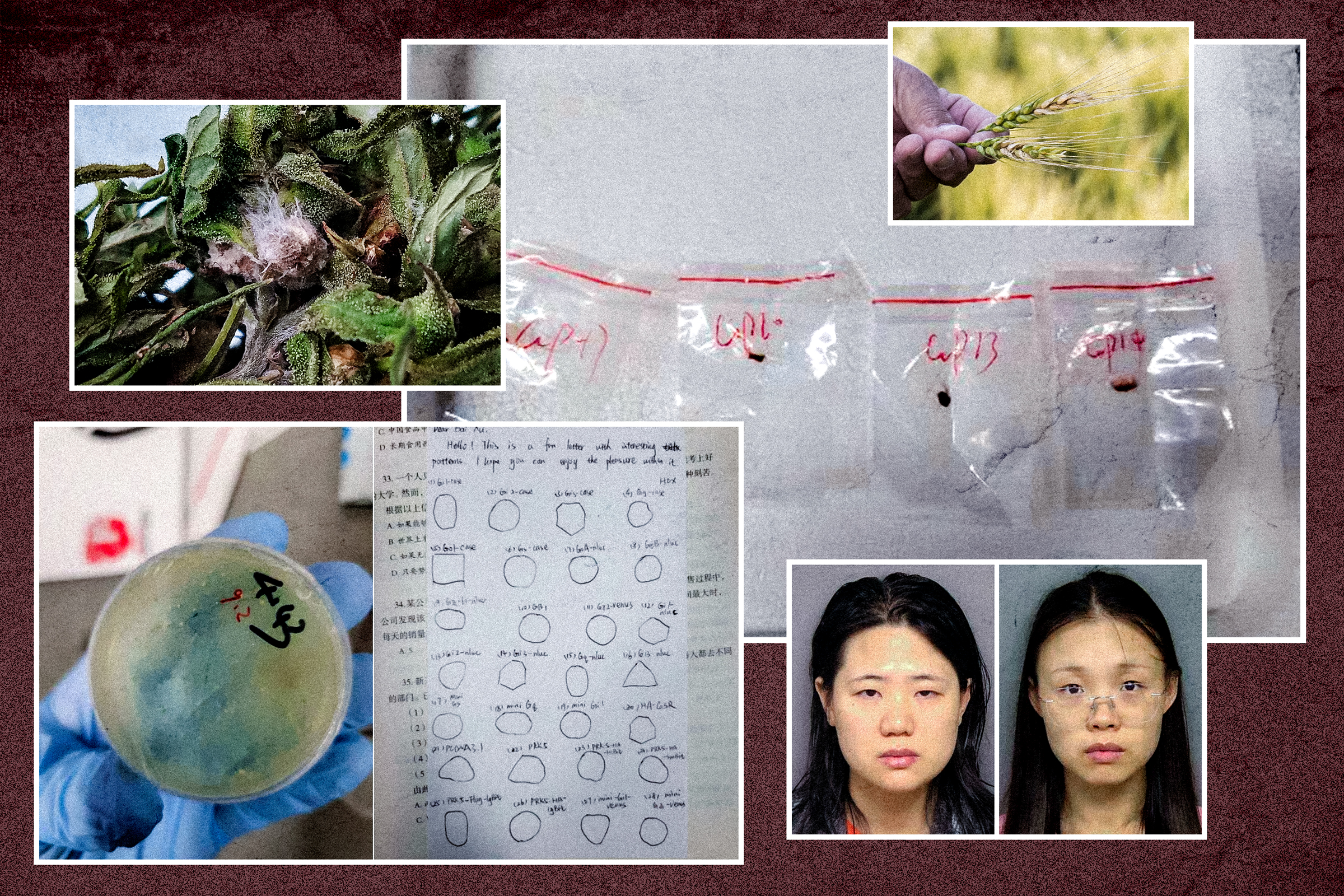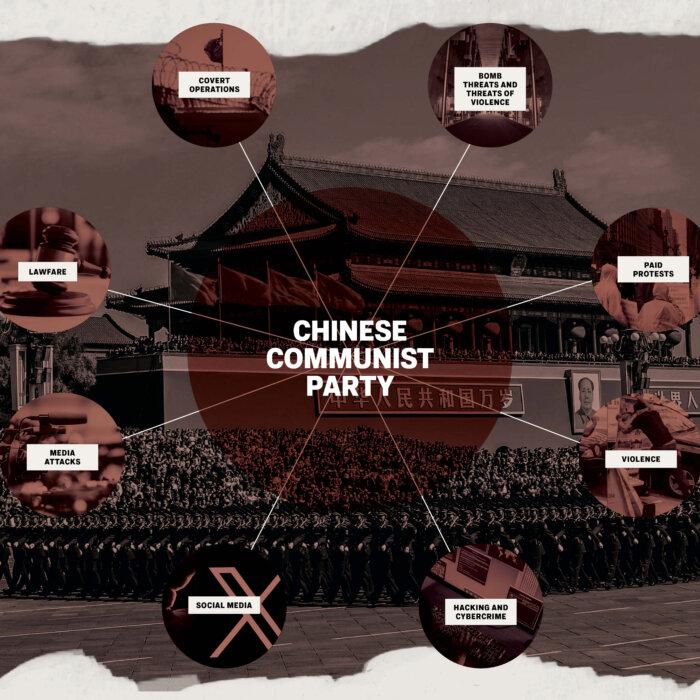After deboarding his international flight in Detroit in July 2024, a Chinese molecular biologist headed to the U.S. Customs area.
There, officers discovered something strange in Liu Zunyong’s bags—a wad of crumpled-up tissue in a small pocket of his backpack, according to a federal criminal complaint.
The tissue concealed a note in Chinese, a round piece of filter paper with a series of circles drawn on it, and four clear plastic bags containing small reddish plant material, the complaint states.
Officers asked Liu, who told them he was visiting his girlfriend in the United States on a B-2 tourist visa, what the objects were.
Initially, he stated that he did not know what the materials were and that someone must have put them in his bag.
When asked why someone would put those materials in his bag, he told investigators he did not know and that maybe he had accidentally put the materials there.
As the questioning became more intense, the complaint states Liu admitted to making false statements. Eventually, he told them the materials were different strains of a toxic fungus known as Fusarium graminearum.
The fungus is a pathogen that could be used in agroterrorism—a form of biological warfare that targets food supply chains through the infection of major crops such as wheat, corn, and rice, according to the complaint.
It also produces toxins harmful to humans and livestock, making it a dual threat to food security and public health.

Jian, who worked at a University of Michigan lab, had allegedly pledged membership and loyalty to the Chinese Communist Party (CCP), according to information found in her electronic devices, the complaint states.
Just a week after the case made headlines, a similar scene played out at Detroit Metro Airport with a third Chinese scientist, Han Chengxuan, a doctoral candidate from China’s Huazhong University of Science and Technology in central China’s Wuhan city.
Han was accused of bringing in biological material from a roundworm. Like the other two Chinese nationals, she was attempting to conduct further research at a University of Michigan lab, according to a federal complaint.
Han allegedly admitted to shipping plasmids and petri dishes of C. elegans, which is a roundworm, to the Michigan lab from Huazhong University of Science and Technology before she arrived, according to the complaint.
The string of recent incidents involving Chinese nationals attempting to smuggle potentially dangerous biological materials into the United States has sparked national security concerns.

Federal authorities, including the FBI, say they have intercepted biological agents capable of devastating U.S. food systems.
Weaponizing Science

Jian, a Chinese researcher at the University of Michigan, is at the center of the first case.
In 2023, she accepted a fellowship position at the Molecular Plant-Microbe Interaction Laboratory at the University of Michigan. The University of Michigan currently lists Jian as a postdoctoral fellow.
According to the federal complaint, Jian said in her visa application that she would “study topics distinct and different” from the fungal pathogen.
She and her boyfriend “apparently intended to use a University of Michigan laboratory to further their scheme,” Gorgon said.
Allegedly, text messages between Jian and her boyfriend, discovered by the FBI on the couple’s phones, indicated that Jian had smuggled “teacher Liang’s seeds” into the United States inside her shoes to avoid detection at San Francisco International Airport in August 2022, according to a federal criminal complaint.
Both molecular biologists studied Fusarium graminearum and wrote scholarly articles about how the fungus attacks and overcomes the defenses of grain crops.
However, the charges against Liu came after he was expelled from the country as “inadmissible” by Customs and Border Protection.
Experts on China and unrestricted warfare said they find the string of arrests alarming.
Especially troubling is the potential for genetic engineering, said Lawrence Sellin, a retired colonel with the Army Reserve and expert on China.
“A genetically-modified agroterrorism weapon could have a more devastating effect on American crops, livestock and human health, as well as causing massive disruption and loss of trust in the food supply,” said Sellin, who compared this potential risk to the early bioengineering behind the virus that causes COVID-19.

Sellin said a comprehensive U.S. government program to protect the food supply is not apparent to most Americans.
In a recent interview with The Epoch Times, Gatestone Institute senior fellow and China expert Gordon Chang said he is convinced that China has been preparing to target U.S. agriculture.
“We are unprepared,“ he said. ”I think that China has been waging an attack on our farms and our ranches for at least half a decade.”
Chang said the arrests of the Chinese scientists was just the latest string of incidents involving the CCP’s “unrestricted warfare” against the United States.
Chang pointed out that in 2020, unsolicited seeds from China were mailed to Americans across the country, prompting warnings in all 50 states from officials to not plant them because of the risk that they contained diseases or invasive species.
Chinese businesses or those with ties to the regime have been buying up U.S. farmland, with some of it located near military or critical infrastructure.
That is a problem because of the CCP’s military-civil fusion policy, which means that civilians must cooperate with Beijing’s military ambitions, Chang said.

But what appears to be flying under the radar is the fact that CCP-controlled farmland could be the perfect spot to launch an agroterrorism attack against the homeland, he said.
Beijing declared the United States an enemy in a May 2019 editorial in People’s Daily, a pro-CCP publication, Chang said.
The editorial declared what the CCP calls a “people’s war” on the United States. To the People’s Liberation Army, that means “total war,” he said.
“So we have to understand we’re under attack, that this is not peacetime, and we need to take measures that are far stricter than we have up to now because if we don’t, we’re going to lose our country,” Chang said.
Chang said the trade agreement does not negate the necessity for enhanced vetting for Chinese researchers in the United States.

Trojan Horse
The arrest of the Chinese scholars underscores deeper concerns about Chinese nationals in sensitive research positions.The university did not respond to questions from The Epoch Times about whether Chinese nationals who are professors, graduate students, or visiting scholars are vetted for CCP membership.
The university pledged cooperation with authorities surrounding the investigation of the Chinese nationals who were arrested.
Also, the university said it will review policies and examine “internal protocols to determine how to improve training and provide additional guidance.” Failure to comply with laws and policies will have consequences that include termination, according to the statement.
While some Chinese universities do not require a CCP loyalty statement, more are moving to do so.
The updates are the first changes made to the code since September 2014.
A clause specifying that a member of the student’s family should remain in China until his or her return aroused concern that the family would be used as a way of ensuring compliance, with the prestigious Karolinska Institute subsequently imposing a temporary pause on enrollments under the scholarship.
Clare Lopez, former CIA operations officer and national security expert, said these incidents are part of a broader strategy outlined in Chinese military doctrine.
“They consider biological warfare against agriculture, animals, and humans as part of their military repertoire,” Lopez told The Epoch Times.
Lopez emphasized the complex pressures on Chinese researchers, noting that they remain potentially obligated to provide intelligence to China’s Ministry of State Security, even after spending years in the United States.

Congress Investigates
In March, congressional scrutiny of CCP influence on U.S. higher education intensified as Rep. John Moolenaar (R-Mich.), chairman of the House Select Committee on the CCP, launched a formal inquiry into six prominent U.S. universities regarding their enrollment of Chinese nationals in advanced STEM programs.The letter highlights growing concerns that U.S. academic institutions may be inadvertently enabling the CCP’s efforts to exploit U.S. technological innovation for strategic and military purposes.
“America’s student visa system has become a Trojan horse for Beijing, providing unrestricted access to our top research institutions and posing a direct threat to our national security,” it reads.
The Epoch Times reached out to the lawyers representing both Chinese nationals for comment.
“Ms. Han is presumed innocent, and we will await further proceedings to comment any further,” her attorney, Sara Garber, an assistant federal defender, stated in an email.
David Duncan, with the law firm Zalkind Duncan & Bernstein, did not immediately respond to a request for comment concerning Jian from The Epoch Times. On Friday, an attorney for Jian declined to comment for an earlier article.













